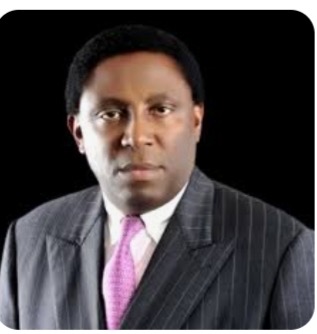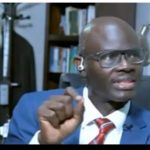By Ivie Emmanuel
An economic expert and investment banker, Adetilewa Adebajo, has blamed Nigeria’s current economic woes on the immediate past administration of President Muhammadu Buhari. Adebajo also attributed the foreign exchange problem the country is faced with to “completely excessive” Ways and Means financing by the Central Bank of Nigeria, CBN, especially during the last administration.
Speaking against the backdrop of Monday’s economic summit during which President Bola Ahmed Tinubu unfolded his plan to build a one trillion United States Dollars (USD) economy, Adebajo, the managing director and chief executive officer, (MD/CEO) of Corporate Finance Group, who was part of the summit, said his best take-away from the event was the admission by the president that though he had made some mistakes, he was ready to correct such mistakes by working with the private sector to make things better.
Sharing his views on the state of the nation on Channels Television programme, Politics Today on Monday, Adebajo said he found President Tinubu’s speech on building a one trillion dollar economy, inspiring, though he insisted that “first of all, the Nigerian economy, right now, is a $1 trillion economy already”. He was however quick to add that “The problem with the Nigerian economy now has been the mismanagement of the last eight years”, noting that “In 2015, our GDP was close to $600 billion, and in the last eight years, we’ve lost about $200 and $250 billion of our GDP, including the current devaluation. If you add that $250 billion that we lost to the $600bn GDP, our GDP right now will be close to $850 billion which is only $150 billion shy of a trillion dollars GDP economy. So, the last eight years, for us, has been a significant loss. So, right now, we need to try to rebuild and get back to where we were”. He said while the potential of the Nigerian economy was not in doubt, “What has hampered this economy has been the mismanagement over the last eight years”.
Adebajo, who appeared hopeful about that ability of the economic team to deliver, said “for the first time, for me, I think there was clarity in terms of the focus for the economic group because after a series of false starts, I think the president made a very clear statement where he identified the issues at hand. And not only did he do that, he had his team with him. So, there was the minister of finance and coordinating minister of the economy, (Wale Edun), the minister of budget and planning, (Atiku Bagudu) and the Central Bank Governor (Yemi Cardoso). For the first time, we saw all three of them in the same room. So, after the president gave his speech and he left, there was a plenary session when these three ministers were put on the stage and they came out with detailed explanations of what their plan was.
“And when you see two ministers and the Central Bank governor who are responsible for the economy, all singing from the same hymn sheet in coordination, in unison, and understanding the issues, then you know that there is progress to be made. And I think the president himself touched on all the issues; he didn’t hide from any of the issues. What he was saying is the fact that yes, he’s not perfect, and some mistakes might have been made, but he’s ready to correct the mistakes and work with the private sector to make things better. For me, I think that was the best take-away”.
He said what the trio had confirmed from the economic summit was that they accepted that things have bottomed out now, and all those things – subsidy payment, and others, have been stopped, – and now they are beginning to rebuild. … For me, the honesty by which the delivery came, also gives a lot of confidence to what they were trying to do, and what they were trying to say.
On the abysmal performance of the naira against the dollar, the economic expert said issues must be put in perspective to understand why there is demand for foreign exchange and what is causing the foreign exchange problem. According to him, “First of all, we have N30 trillion in Ways and Means financing, which is an illegal financing means. The Ways and Means financing on the CBN balance sheet, should not be more than one trillion. So Ways and Means financing is 30 times over the limit, which is completely excessive. So, that itself is putting pressure on the inflation.
“So, the biggest challenge we have in our economy today is inflation. Real rates and real yields are negative, so that if you put N10 million in your bank account today, the interest rates they are paying you, you probably will be making a loss of close to 11, 12 percent every year so nobody wants to lose value on their investment; so, what do people do? They put their money into dollars. So, because the real yields in the country are negative, people are looking for foreign exchange as a viable asset to store value because of inflation. So, we also need to address the inflationary pressure on the economy. So, if you bring down the rate of inflation to a significant level, then you will also reduce that demand for foreign exchange because foreign exchange demand is not only going towards goods and services, people are also using it as a store of value”.







Leave a Reply